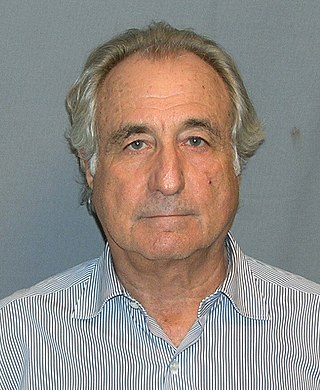
Charles Ponzi was an Italian charlatan and con artist who operated in the United States and Canada. His aliases included Charles Ponci, Carlo, and Charles P. Bianchi.

Philatelic investment is investment in collectible postage stamps for the purpose of realizing a profit. Philatelic investment was popular during the 1970s but then fell out of favour following a speculative bubble and prices of rare stamps took many years to recover.

МММ was a Russian company that perpetrated one of the world's largest Ponzi schemes of all time, in the 1990s. By different estimates from 5 to 10 million people lost their savings. According to contemporary Western press reports, most investors were aware of the fraudulent nature of the scheme, but still hoped to profit from it by withdrawing money before it collapsed.
James "Jim" Paul Lewis Jr. operated one of the largest and longest running Ponzi schemes in United States history.
Sunshine Empire was a Multi Level Marketing (MLM) company, set up in 2006, based in Singapore. It is now defunct, with assets frozen by the Singapore Court. The company is listed by the Singapore Government's Monetary Authority in its Investor's Alert List, for possibly running investment schemes without authority. After investigation by the Commercial Affairs Department (CAD) of the Singapore Police and a court trial, Sunshine Empire's Directors were charged with and found guilty of fraud, criminal breach of trust and falsifying accounts.
Thomas Joseph Petters is a former American businessman and chairman and CEO of Petters Group Worldwide, a company which stole over $2 billion in a Ponzi scheme. He was convicted of massive business fraud in 2009 and was imprisoned at the United States Penitentiary, Leavenworth. Amid mounting criminal investigations, Petters resigned as his company's CEO on September 29, 2008. He was convicted of numerous federal crimes for operating Petters Group Worldwide as a $3.65 billion Ponzi scheme and received a 50-year federal sentence.

Bernard Lawrence Madoff was an American financial criminal and financier who was the admitted mastermind of the largest known Ponzi scheme in history, worth an estimated $65 billion. He was at one time chairman of the Nasdaq stock exchange. Madoff's firm had two basic units: a stock brokerage and an asset management business; the Ponzi scheme was centered in the asset management business.
David G. Friehling is an American accountant who was arrested and charged in March 2009 for his role in the Madoff investment scandal. He subsequently pleaded guilty to rubber-stamping Bernard Madoff's filings with regulators rather than fully reviewing them. His role in covering up Madoff's massive Ponzi scheme makes it the largest accounting fraud in history.

The Madoff investment scandal was a major case of stock and securities fraud discovered in late 2008. In December of that year, Bernie Madoff, the former Nasdaq chairman and founder of the Wall Street firm Bernard L. Madoff Investment Securities LLC, admitted that the wealth management arm of his business was an elaborate multi-billion-dollar Ponzi scheme.

Participants in the Madoff investment scandal included employees of Bernard Madoff's investment firm with specific knowledge of the Ponzi scheme, a three-person accounting firm that assembled his reports, and a network of feeder funds that invested their clients' money with Madoff while collecting significant fees. Madoff avoided most direct financial scrutiny by accepting investments only through these feeder funds, while obtaining false auditing statements for his firm. The liquidation trustee of Madoff's firm has implicated managers of the feeder funds for ignoring signs of Madoff's deception.
Laura Pendergest-Holt is a convicted Ponzi scheme perpetrator, financier, and former chief investment officer of Stanford Financial Group, who was charged with a civil charge of fraud on February 17, 2009. On May 12, 2009, Pendergest-Holt was indicted by a federal grand jury on two counts of a criminal complaint of obstructing a fraud investigation and conspiracy to obstruct justice. In early 2009, Stanford Financial became the subject of several fraud investigations, and on February 17, 2009, Pendergest-Holt was charged by the U.S. Securities and Exchange Commission with fraud and multiple violations of U.S. securities laws for alleged "massive ongoing fraud" involving $8 billion in certificates of deposit. The FBI raided three of Stanford's offices in Houston, Memphis, and Tupelo, Mississippi. On February 27, 2009, the SEC amended its complaint to describe the alleged fraud as a "massive Ponzi scheme". On June 21, 2012, she pleaded guilty to obstructing a U.S. Securities and Exchange Commission investigation into Stanford International Bank (SIB), the Antiguan offshore bank owned by Robert Allen Stanford. On September 13, 2012, Holt was sentenced to three years in prison, followed by three years of supervised probation. She was released on April 23, 2015.
The K1 fund was a British Virgin Islands based hedge fund, initially marketed to and invested in by mainly German-based private investors, and latterly a series of global banks. With an estimated size of $378million/£249million and $1Bn under management, it collapsed in 2008. It is estimated by administrators Grant Thornton that liquidated funds able to be returned to investors are zero. BaFin is suspected by German regulators to be a ponzi scheme.
Daniel Bonventre is one of five former Madoff employees charged in the Madoff investment scandal.
Business Consulting International was a London-based investment company that collapsed after being exposed by a City of London Police investigation in 2008 as the United Kingdom's biggest ponzi scheme, estimated at £115M. The business was set up and run by Kautilya Nandan Pruthi, a London-based Indian businessman, in partnership with Kenneth Peacock and John Anderson, who both lived in Sunningdale, Surrey.

The Saradha Group financial scandal was a major political scandal caused by the collapse of a Ponzi scheme run by Saradha Group, a consortium of over 200 private companies that was believed to be running collective investment schemes popularly but incorrectly referred to as chit funds in Eastern India.
British American Investment (BAIC) was an investment conglomerate based in Mauritius. Seized by the Government of Mauritius in 2015 for operating an alleged ponzi scheme that has never been prosecuted or proven in any court of law. However BAIC could not provide sufficient information and details about its irregularities in its operations.
Ezubao was a peer-to-peer lending scheme based in the eastern Chinese province of Anhui. It was set up as an online scheme in July 2014, attracted funds of about 50 billion yuan from 900,000 investors, and ceased to trade in December 2015. On 1 February 2016, the scheme was closed down and 21 involved people were arrested. Zhang Min, the president of the parent company, Yucheng Global, told investigators that the company operated as a Ponzi scheme. Following its establishment, Ezubao grew rapidly, masquerading as a legitimate investment opportunity while operating under the guise of peer-to-peer lending. Revelations about the fraudulent nature of Ezubao’s operations emerged after an exposé in late 2015, leading to public outcry and intensified scrutiny by regulatory authorities. The scale of Ezubao’s Ponzi scheme, which orchestrated a sophisticated ruse involving fake projects and returns, was unprecedented in China, contributing to an estimated loss of billions of yuan for investors. The scandal not only devastated the finances of nearly a million individuals but also prompted a nationwide tightening of regulations on the peer-to-peer lending industry, aiming to close loopholes and restore investor confidence.

Aalima Nowhera Shaik is an Indian entrepreneur and politician who has been accused of serious offences under the Prevention of Money Laundering Act and under investigation by the Serious Fraud Investigation Office. She is the executive chairperson and founder of Heera Group and founder and current president of the All India Mahila Empowerment Party.





